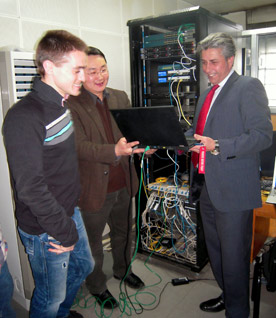Launch of Two SPS Projects in Mongolia
The first two civilian cooperation projects between NATO and Mongolia within the framework of the Science for Peace and Security (SPS) Programme were launched on February 28 in Ulaanbaatar.

One project will establish a geo-database for the restoration of former military sites and will be carried out over the next two years by the Slovak Environmental Agency and the Institute of Geo-ecology at the Mongolian Academy of Sciences. This represents an important step in the process of rehabilitating degraded land in Mongolia.

The second project lies in the field of information technology support and includes an upgrade to the information infrastructure of the Mongolian Academy of Sciences along with training. This will be jointly implemented by the Institute for Informatics at the Mongolian Academy of Sciences and the NATO Communications and Information Agency.
Both projects were launched at a ceremony jointly hosted by the Ministry of Foreign Affairs, the Ministry of Defence, and the Mongolian Academy of Sciences. Vice Defence Minister A. Battur underlined the Mongolian contribution to NATO-led operations and welcomed the new civilian cooperation with the Alliance through the SPS Programme. He further emphasised his government’s commitment to ‘continue working closely with NATO in the future’.
Ts. Batbayar, Director of Policy Planning at the Ministry of Foreign Affairs, praised the SPS Programme as an ‘excellent venue for mutual and beneficial cooperation on issues of common interest,’ and pledged full support to the successful implementation of the two projects.
The President of the Mongolian Academy of Sciences, B. Enkhtuvshin, highlighted the swift set up of both projects, and attached strong importance to cooperation in the field of science and technology. He reaffirmed that the knowledge acquired from the projects will be shared among Mongolian experts and serve future efforts in these fields.
Michael Gaul, Senior Advisor in the Emerging Security Challenges Division recognized the launch of these two projects as ‘an important achievement less than one year after Mongolia became the 8th global partner of the Alliance with the adoption of its first Individual Partnership Cooperation Programme last March’. He added that ‘while geography may separate the Euro-Atlantic region and Mongolia, both NATO Allies and global partners of the Alliance face similar security challenges and share common values that call for close cooperation’.
The launch event was also attended by several Allied Embassies in Ulaanbaatar, including the Ambassadors of France, Canada, and Turkey, with representatives from Germany and the United States also present.
